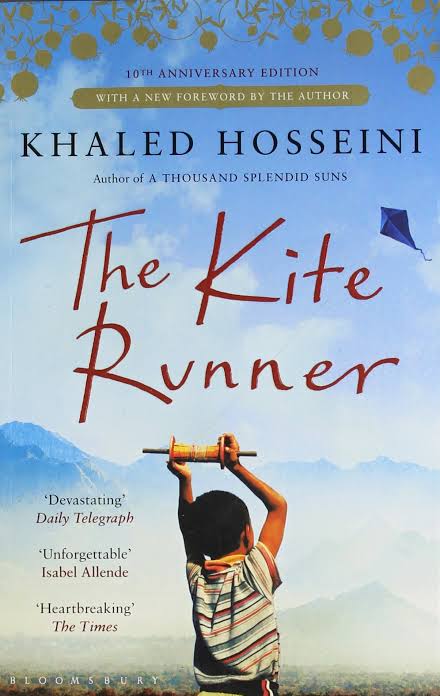
The Kite Runner
فرمت کتاب
ebook
تاریخ انتشار
2004
Lexile Score
840
Reading Level
4-5
ATOS
5.2
Interest Level
9-12(UG)
نویسنده
Khaled Hosseiniشابک
9781101217238
کتاب های مرتبط
- اطلاعات
- نقد و بررسی
- دیدگاه کاربران
نقد و بررسی

Starred review from May 12, 2003
Hosseini's stunning debut novel starts as an eloquent Afghan version of the American immigrant experience in the late 20th century, but betrayal and redemption come to the forefront when the narrator, a writer, returns to his ravaged homeland to rescue the son of his childhood friend after the boy's parents are shot during the Taliban takeover in the mid '90s. Amir, the son of a well-to-do Kabul merchant, is the first-person narrator, who marries, moves to California and becomes a successful novelist. But he remains haunted by a childhood incident in which he betrayed the trust of his best friend, a Hazara boy named Hassan, who receives a brutal beating from some local bullies. After establishing himself in America, Amir learns that the Taliban have murdered Hassan and his wife, raising questions about the fate of his son, Sohrab. Spurred on by childhood guilt, Amir makes the difficult journey to Kabul, only to learn the boy has been enslaved by a former childhood bully who has become a prominent Taliban official. The price Amir must pay to recover the boy is just one of several brilliant, startling plot twists that make this book memorable both as a political chronicle and a deeply personal tale about how childhood choices affect our adult lives. The character studies alone would make this a noteworthy debut, from the portrait of the sensitive, insecure Amir to the multilayered development of his father, Baba, whose sacrifices and scandalous behavior are fully revealed only when Amir returns to Afghanistan and learns the true nature of his relationship to Hassan. Add an incisive, perceptive examination of recent Afghan history and its ramifications in both America and the Middle East, and the result is a complete work of literature that succeeds in exploring the culture of a previously obscure nation that has become a pivot point in the global politics of the new millennium. (June 2)Forecast:It is rare that a book is at once so timely and of such high literary quality. Though Afghanistan is now on the media back burner, its fate is still of major interest and may become even more so as the U.S.'s nation-building efforts are scrutinized. 10-city author tour; foreign rights sold in Canada, Finland, France, Germany, Greece, Holland, Israel, Spain, Sweden and the U.K.

Baron Zhang - Among the recommended reading list for young adults, The Kite Runner stands out in the category of its in depth exploration of betrayal, redemption and self-identity. The novel is written by Khaled Hosseini, an Afghan-American writer. It tells a story of Amir who suffers from childhood trauma, and finds his identity in the world eventually. The story can be divided into three sections: Amir’s childhood in Afghanistan, Amir and his father’s life in the U.S., and Amir’s return to Afghanistan. In his childhood, Amir lived with his father in a privileged family in Kabul, while Ali and his son Hassan stayed as servants. The two boys become best friends. Hassan is always ready to help and protect Amir. However, their friendship is destroyed and ends in an unexpected way. Amir was eager to prove his skills and bravery to satisfy his father, so he longed to win the kite running tournament which is a big event. Hassan successfully took back Amir’s kite and helped him win the event, but Amir did not stand out to protect Hassan from being abused and humiliated. Out of guilt, Amir framed Hassan up and drove Hassan and his father away from his home. Later when the political and military conflicts became fierce, Amir moved to California, U.S. with his father and started a new life from scratch. Years later when his father died and Amir finally settled down with his wife, he received a phone call from an old friend of his father who told him “There is a way to be good again.” That is when and why Amir returned to Kabul and found out that Hassan’s son Sohrab is in danger. Amir conquered his inner struggles with the facts that how Hassan and his family sacrificed for Amir’s family, that Hassan is indeed his half-brother, that Sohrab becomes an orphan and lives in a life risking situation, etc. Amir decided to mend his long-lasting guilt toward Hassan, face his cowardice, and seek redemption by rescuing Sohrab. This time, Amir did it and he took Sohrab back to the U.S. and taught the boy to fly the kite. Looking at the flying kite, Amir heard Hassan telling him “For you, a thousand times over.” from which he finally finds inner peace with himself and finds his identity to be “be good again.” The ending is very promising and powerful as Charlie B. remarked that “The message behind the very ending could be interpreted differently by different readers, but personally I feel that it offers a small sense of hope for both the future of its characters, and perhaps for war-torn Afghanistan as well.” Charlie B, https://www.theguardian.com/childrens-books-site/2014/jul/30/review-khaled-hosseini-the-kite-runner I would highly recommend this book to readers from young adults and above. As remarked in dogobooks, this novel is “A powerful story of friendship, it is also about the power of reading, the price of betrayal, and the possibility of redemption; and an exploration of the power of fathers over sons—their love, their sacrifices, their lies.”

























دیدگاه کاربران